-
Consistency is King: Establish a reliable routine with regular potty breaks, feeding times, and crate training.
-
Supervision and Confinement: Keep a watchful eye on your puppy and confine them to a safe area when you can't supervise them directly.
-
Accidents Happen: Don't panic! Identify the cause, adjust your plan, and keep moving forward.
-
Cleanliness Matters: Use enzyme cleaners to eliminate odors completely and prevent repeat offenses.
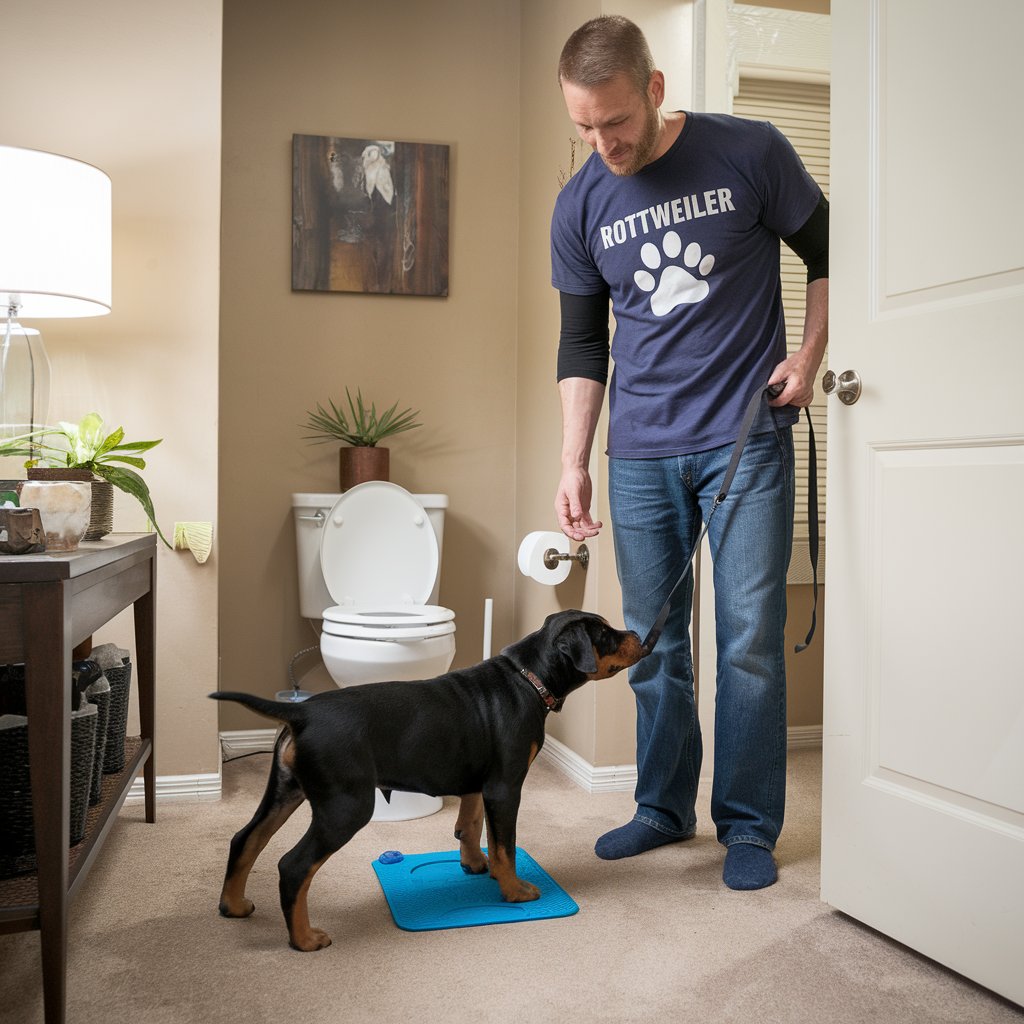
Tired of cleaning up puppy puddles and wondering if your Rottweiler will ever get the hang of potty training? Don’t worry, you’re not alone! Housebreaking a Rottweiler puppy can be a challenge, but with the right approach, you can turn that adorable ball of energy into a well-mannered companion.
This guide will walk you through everything you need to know to housebreak your Rottweiler puppy, from understanding their unique needs to troubleshooting those inevitable accidents. We’ll cover the importance of consistency, positive reinforcement, and a whole lot of patience. Get ready to say goodbye to those puppy messes and hello to a happy, house-trained Rottie!
Understanding Your Rottweiler Puppy
So, you’ve welcomed a Rottweiler puppy into your home—congratulations! Get ready for a whole lot of love, loyalty, and let’s be honest, a few challenges along the way. Understanding your Rottweiler puppy’s unique traits and behaviors is key to successful housebreaking.
Rottweilers: More Than Meets the Eye
Rotties often get a bad rap, but beneath that tough exterior is a loving and intelligent companion. Here’s what you need to know about their personality:
- Intelligent and Eager to Please: Rottweilers are quick learners, which is great news for training! They’re eager to please their humans, making them receptive to positive reinforcement.
- Strong-Willed: Rotties have minds of their own. While this independence can be a plus, it also means you’ll need to be consistent and patient during housebreaking.
- Protective Instincts: Bred to guard, Rottweilers can be naturally wary of strangers and new situations. Early socialization is crucial to help them distinguish between friend and foe (and avoid a 100-pound lapdog who guards the house from the mailman!).
Puppy Behaviors and Potty Training
Understanding typical Rottweiler puppy behaviors can give you a head start in potty training:
- Playful Nipping: Those sharp puppy teeth can be a bit much! While this is normal puppy behavior, it’s important to redirect this nipping to appropriate chew toys.
- High Energy: Rotties are energetic pups who need plenty of exercise. A tired puppy is often a well-behaved puppy, so make sure they get enough playtime.
- Sensitivity: Rotties can be sensitive to changes in their environment or routine. Keep things consistent during potty training to avoid stress and potential accidents.
Challenges Specific to Rottweilers
While every puppy is different, some challenges are more common with Rottweilers:
- Dominance: Rotties can have a dominant streak. It’s important to establish yourself as the leader early on through consistent training and clear boundaries.
- Over-Excitement: Rotties can get overly excited when meeting new people or dogs. This excitement can sometimes lead to accidents, so it’s important to manage their enthusiasm.
By understanding your Rottweiler puppy’s unique personality and potential challenges, you’ll be well-equipped to tackle housebreaking with confidence and patience.
Gearing Up for Housebreaking Success: Essential Supplies
Before you embark on your housebreaking adventure, it’s important to have the right tools for the job. Here’s a list of essential supplies that will make the process smoother for both you and your Rottweiler puppy:
- A Cozy Crate
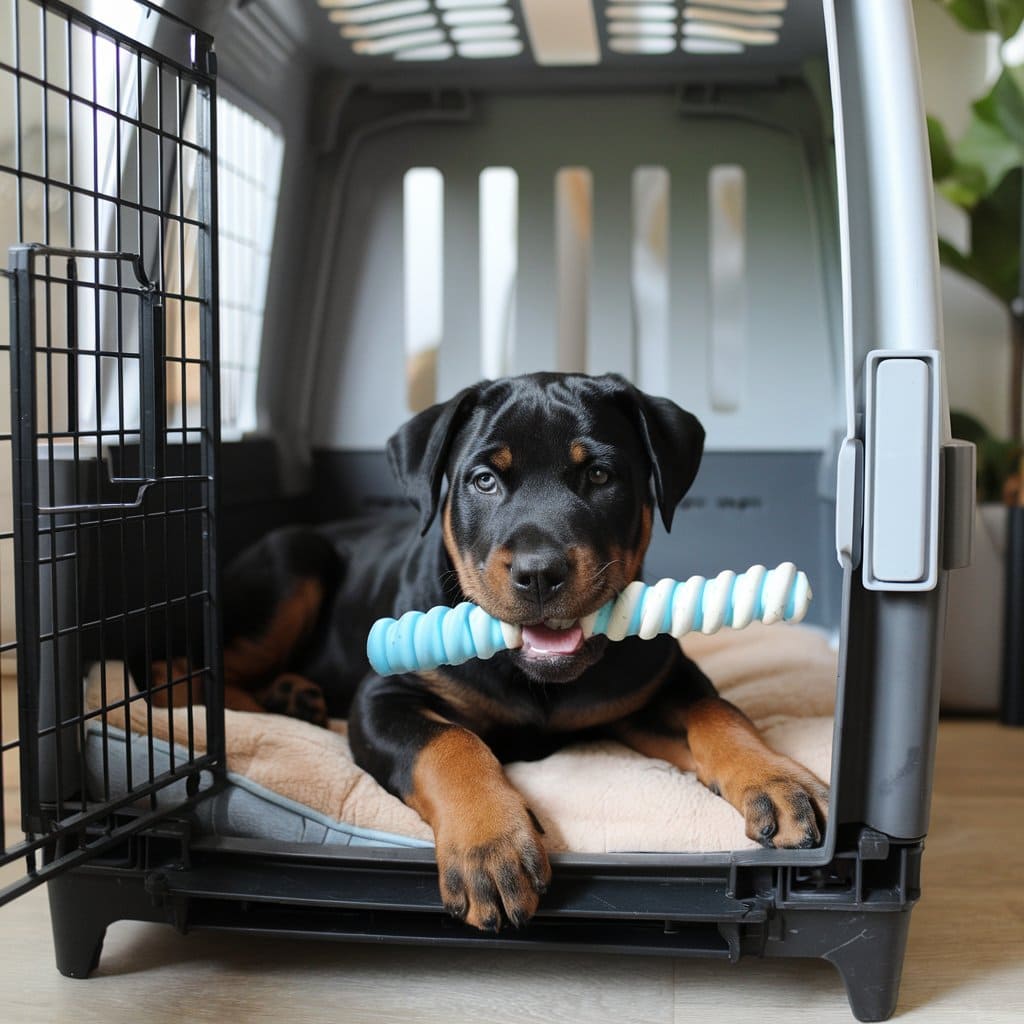
Think of a crate as your puppy’s den—a safe and comfortable space where they can relax and, yes, even learn to control their bladder!
Size Matters: Choose a crate that’s large enough for your puppy to stand up, turn around, and lie down comfortably. But avoid a crate that’s too big, as they may be tempted to use one corner as a bathroom.
Types of Crates: You’ll find various types of crates, including wire crates, plastic crates, and fabric crates. Wire crates offer good ventilation, plastic crates are easy to clean, and fabric crates are portable. Choose the type that best suits your needs and lifestyle.
- Enzyme Cleaner: Your New Best Friend
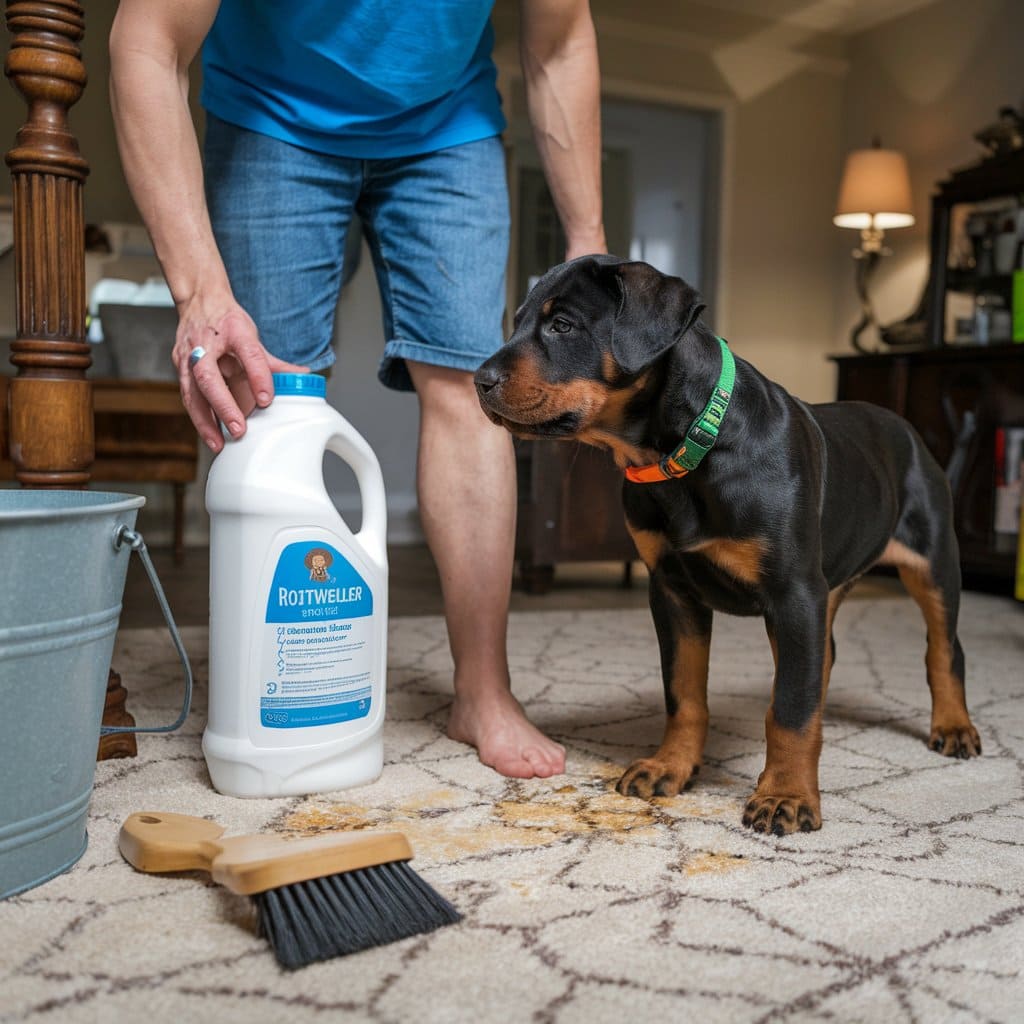
Accidents happen! But don’t just mask the odor with regular cleaners. Enzyme cleaners are specifically designed to break down the proteins in pet urine, eliminating the smell completely. This prevents your puppy from being drawn back to the same spot.
Puppy Pads (Optional)
Puppy pads can be helpful for those times when you can’t supervise your puppy constantly or if you live in an apartment building. However, it’s important to use them strategically and transition your puppy to going potty outdoors as soon as possible.
- High-Value Treats
Positive reinforcement is key to successful housebreaking. Stock up on small, tasty treats that your puppy loves. These will be your secret weapon for rewarding those potty successes!
- A Sturdy Leash
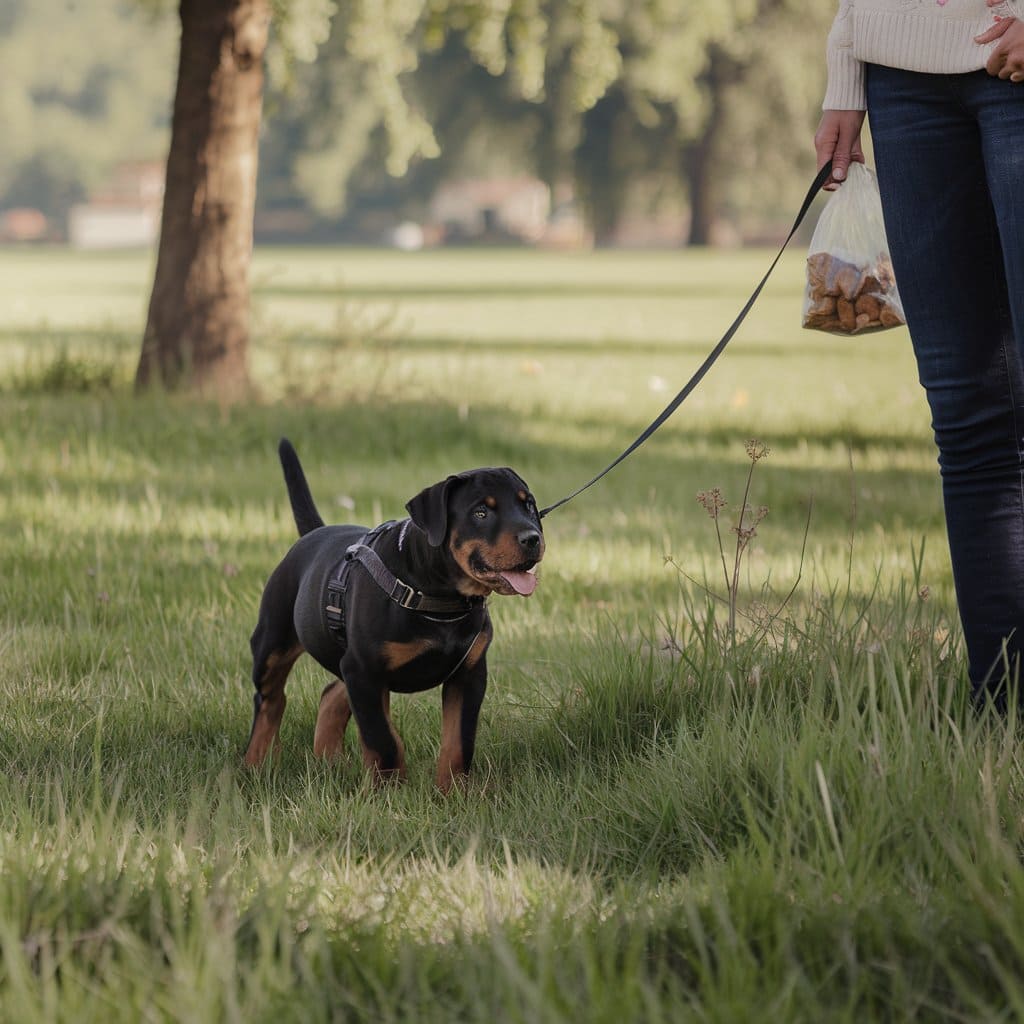
A leash is essential for taking your puppy to their designated potty area. Choose a leash that’s comfortable to hold and appropriate for your puppy’s size.
- Baby Gates (Optional)
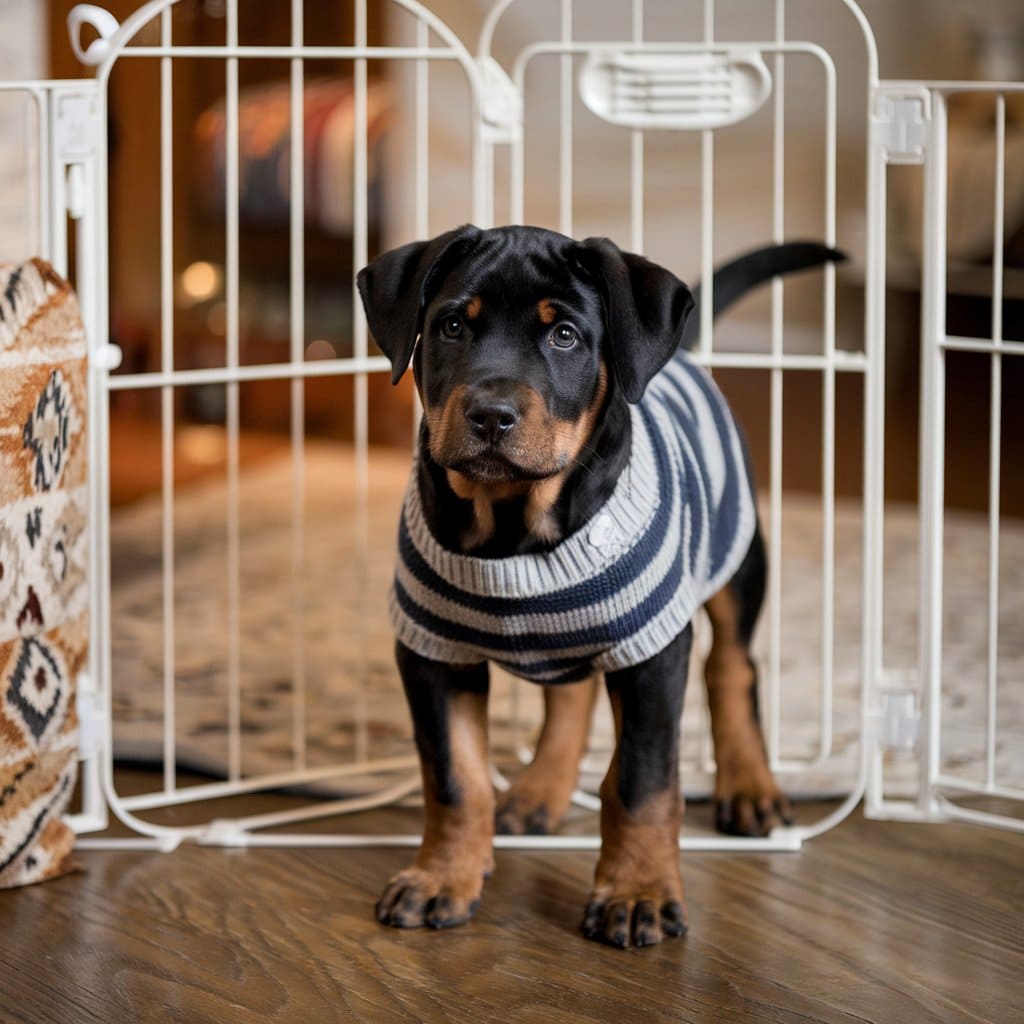
Baby gates can be useful for confining your puppy to a specific area of your home when you can’t supervise them directly. This helps prevent accidents and keeps them out of trouble.
With these essential supplies in hand, you’ll be well-prepared to tackle the housebreaking journey with your Rottweiler puppy!
Housebreaking Strategies: Your Roadmap to Success
Establish a Rock-Solid Routine
Puppies thrive on predictability, and a consistent routine is the cornerstone of successful housebreaking. Think of it as setting your Rottie pup up for success! Here’s how:
- Consistent Feeding Schedule: Imagine trying to go to the bathroom on an empty stomach…not fun, right? The same goes for your puppy! Feeding your puppy at the same times each day helps regulate their digestion and makes it easier to predict when they’ll need to go potty. Sticking to a schedule helps them (and you!) get into a rhythm.
- Frequent Potty Breaks: Puppies have tiny bladders! Think of them like a little teacup that fills up quickly. Take your puppy out frequently, especially first thing in the morning, after naps, after meals, and before bedtime. A good rule of thumb is to take them out every 1-2 hours. Yes, it might feel like you’re constantly running outside, but it’s worth it in the long run!
- Designated Potty Area: Choose a specific spot in your yard for your puppy to go potty. This helps them associate that area with eliminating and reduces confusion. Think of it like their own personal bathroom! This also helps keep your yard clean and prevents your pup from turning it into a minefield.
- Crate Training Integration: A crate is a valuable tool for housebreaking. It provides a den-like space where your puppy feels safe and naturally avoids soiling their sleeping area. Think of it like their own little apartment. When you can’t supervise your puppy, the crate helps prevent accidents and reinforces the idea of holding it until they go outside.
By combining a consistent routine with positive reinforcement, you’ll create a clear path to housebreaking success for your Rottweiler puppy. Remember, patience and consistency are your superpowers!
Okay, so you’ve got the routine down, now it’s time to unleash the power of positivity! Positive reinforcement is like magic when it comes to housebreaking your Rottweiler puppy. It’s all about making them feel like a superstar when they get it right.
- Immediate Rewards: Timing is everything! As soon as your puppy finishes going potty in the designated area, shower them with praise and a tasty treat. Think of it like a celebratory dance party—the faster you reward them, the stronger the connection they’ll make between the action (going potty outside) and the reward (treats and praise).
- Consistent Verbal Cue: Choose a phrase like “Go potty!” or “Do your business!” and use it consistently while your puppy is eliminating. This helps them associate the action with the command. It’s like their own personal potty mantra!
- Avoid Punishment: Accidents happen! Never punish your puppy for accidents. It can create fear and anxiety, making them less likely to go potty in front of you. Remember, they’re still learning. Focus on positive reinforcement instead, and those accidents will become less and less frequent.
Why Positive Reinforcement Works Wonders
Positive reinforcement makes housebreaking a happy experience for your puppy. It builds trust, strengthens your bond, and motivates them to keep doing the right thing. Who wouldn’t want to repeat an action that leads to yummy treats and happy praise?
By combining a consistent routine with positive reinforcement, you’ll create a clear path to housebreaking success for your Rottweiler puppy. Remember, patience and consistency are your superpowers!
Supervision and Confinement: Preventing Accidents Before They Happen
Okay, you’ve got the routine, the positive vibes are flowing, but let’s be real, you can’t keep your eyes on your Rottweiler puppy 24/7. That’s where supervision and confinement come in—your secret weapons for preventing accidents before they happen!
- Constant Supervision: When your puppy is out and about in the house, treat it like a stakeout! Keep a close eye on them for any signs they need to go potty—sniffing, circling, squatting, you know the drill. If you catch them in the act, quickly scoop them up and whisk them outside to their designated potty area.
- Confinement When Unsupervised: When you can’t be there to supervise every move (because even superhero puppy parents need a break!), confine your puppy to a safe area. This could be their crate, a puppy-proofed room, or a playpen. This prevents them from wandering off and having accidents in hidden corners of your house.
- Utilize Baby Gates: Baby gates are your friends! They can be super helpful for limiting your puppy’s access to certain areas of your home. This keeps them out of trouble and prevents accidents in rooms you haven’t fully puppy-proofed. Plus, it helps them gradually adjust to more freedom as they get the hang of housebreaking.
Troubleshooting Accidents: Why Did My Puppy Pee on the Rug?!
Okay, let’s be real, even with the best-laid plans, accidents happen. But don’t worry, it’s not the end of the world! The key is to figure out why the accident happened in the first place so you can prevent it from happening again. Here are some common culprits and how to tackle them head-on:
- Lack of Supervision: Remember those superhero puppy parents we talked about? Even they need a break sometimes. But leaving your puppy unsupervised for too long is a recipe for accidents. Puppies have a limited ability to “hold it,” especially when they’re young.
- Solution: If you can’t keep a close eye on them, confine them to their crate or a puppy-proofed area. Think of it like their own little safe zone where they can relax and avoid temptation.
- Medical Issues: Sometimes, accidents can be a sign of an underlying medical issue, such as a urinary tract infection or intestinal upset.
- Solution: If your puppy suddenly starts having more accidents than usual, or if you notice other symptoms like straining to urinate or blood in their urine, it’s time for a trip to the vet. Don’t hesitate to get them checked out—it’s better to be safe than sorry!
- If you suspect your puppy’s accidents might be due to a medical issue, it’s important to consult your veterinarian. VCA Animal Hospitals offers information on common urinary tract problems in dogs.
- Insufficient Potty Breaks: Think back to that teacup analogy! If you’re not taking your puppy out frequently enough, their little bladder is bound to overflow.
- Solution: Stick to the schedule, and don’t be afraid to add in extra trips outside if needed. Especially when they’re young, those potty breaks need to be pretty frequent. It might feel like a lot, but trust us, it’s worth it!
- Excitement or Anxiety: Rottweilers can be sensitive souls! Sometimes, accidents can happen when they’re overly excited (like when you come home from work) or anxious (like during a thunderstorm).
- Solution: If you know your puppy is prone to excitement peeing, try to keep greetings calm and low-key. For anxiety-related accidents, create a safe and comforting environment for your puppy. Maybe a cozy den with their favorite blanket?
- Dietary Issues: What goes in must come out! If your puppy is eating a low-quality diet or has food sensitivities, it can lead to digestive upset and accidents.
- Solution: Talk to your vet about the best food for your Rottweiler puppy. They can help you choose a diet that’s nutritious and easy on their tummy.
- Incomplete Cleaning: Remember that enzyme cleaner we talked about? It’s not just for show! If you don’t clean up accidents thoroughly with an enzyme cleaner, the lingering smell can attract your puppy back to the same spot.
- Solution: Think of enzyme cleaner as your secret weapon against those lingering accident scents. It eliminates the odor completely, preventing your puppy from being drawn back to the scene of the crime.
Regression: Taking a Step Back
Sometimes, even when things are going well, your puppy might have a few accidents. This is called regression, and it’s totally normal! It could be due to changes in their environment, stress, or simply a lapse in your training routine.
- Getting Back on Track: If your puppy starts having accidents again, don’t panic! Go back to basics: increase supervision, reinforce potty breaks, and make sure you’re cleaning up accidents thoroughly. You’ll get back on track in no time!
By identifying the cause of the accident and implementing the right solutions, you can help your Rottweiler puppy become a housebreaking champion!
Dealing with Setbacks: Riding the Potty Training Rollercoaster
So, you’re cruising along, thinking your Rottweiler puppy is a housebreaking superstar, and then BAM! An accident happens. Or two. Or maybe even a string of them. Don’t worry, you haven’t failed! Setbacks are a normal part of the potty training process. Think of it like riding a rollercoaster—there will be ups and downs, twists and turns, but you’ll get to the finish line eventually.
Why Setbacks Happen
There are a few reasons why your puppy might suddenly start having accidents again:
- Changes in Routine: Puppies thrive on routine. Any changes in their schedule, environment, or even your own stress levels can throw them off balance and lead to accidents. Maybe you’ve been working longer hours, or you’ve had visitors staying over. Even seemingly small changes can have a big impact on your puppy.
- Developmental Stages: As puppies grow and develop, their bodies and bladders change. They might need more frequent potty breaks or have a harder time holding it overnight. It’s like their internal plumbing is undergoing renovations!
- Excitement and Distractions: Remember how we talked about Rotties being sensitive souls? If they get overly excited or distracted, they might forget their potty training manners. It’s like their brain temporarily shuts down and they go on autopilot.
Staying Positive and Adjusting Your Plan
The key to dealing with setbacks is to stay positive and adjust your training plan as needed. Here are a few tips:
- Don’t Panic: Accidents happen. Getting frustrated or punishing your puppy will only make things worse. Take a deep breath and remember that this is a journey, not a race.
- Revisit the Basics: Go back to the fundamentals of housebreaking: increase supervision, reinforce potty breaks, and make sure you’re cleaning up accidents thoroughly. Sometimes, a little refresher course is all it takes to get back on track.
- Adjust Your Schedule: If your puppy is having accidents more frequently, they might need more potty breaks. Try taking them out every hour instead of every two hours. You can also adjust their feeding schedule to help regulate their digestion.
- Manage Excitement and Distractions: If excitement or distractions are causing accidents, try to create a calmer environment for your puppy. Keep greetings low-key and minimize distractions during potty breaks.
- Consider a Vet Visit: If the accidents persist despite your best efforts, it’s always a good idea to rule out any underlying medical issues. Your vet can help you determine if there’s something more going on.
- The Humane Society of the United States offers valuable resources on dog behavior and training, including tips for overcoming challenges and setbacks in housebreaking.
Remember, setbacks are a normal part of the potty training process. By staying positive, adjusting your plan, and continuing to provide consistent guidance, you’ll help your Rottweiler puppy overcome any challenges and become a housebreaking champion!
Recognizing Success: Hooray, My Rottweiler is House-Trained!
You’ve been diligently following the routine, celebrating the wins, and cleaning up the occasional accident. But how do you know when your Rottweiler puppy is truly house-trained? And how can you ensure those good habits stick around for the long haul? Let’s dive in!
What Does Success Look Like?
Here are some signs that your Rottweiler puppy is mastering the art of housebreaking:
- No More Accidents: Your puppy consistently eliminates in their designated potty area and hasn’t had an accident in the house for a significant period (think weeks, not just days!).
- Signals and Communication: Your puppy starts giving you clear signals that they need to go out, like barking at the door, whining, or pacing. They’re basically saying, “Hey, human, I gotta go!”
- Holding it Longer: As your puppy gets older, they can hold their bladder for longer periods. You’ll notice they can go through the night without needing a potty break, and they can wait longer between trips outside during the day.
Expected Progress: A Realistic Timeline
Every puppy is different, but here’s a general timeline for housebreaking a Rottweiler puppy:
- 8-12 weeks: This is the prime time to start housebreaking! Your puppy is learning quickly, but they’ll still need frequent potty breaks and close supervision.
- 3-6 months: With consistent training and positive reinforcement, most puppies start to get the hang of it during this period. Accidents become less frequent, and they can hold their bladder for longer.
- 6-12 months: By this age, many Rottweilers are fully house-trained. They can reliably hold it through the night and go for several hours between potty breaks during the day.
Tips for Maintaining Good Habits Long-Term
Congratulations, your Rottweiler is house-trained! But the journey doesn’t end there. Here are some tips for maintaining those good habits and preventing regression:
- Stick to the Routine: Even after your puppy is house-trained, it’s important to maintain a consistent routine with regular potty breaks.
- Reinforce Good Behavior: Continue to praise and reward your dog for going potty in the designated area. This helps reinforce the behavior and keeps them motivated.
- Watch for Signals: Pay attention to your dog’s signals that they need to go out. Don’t ignore their cues!
- Be Prepared for Changes: Life happens! If there are any changes in your routine or environment, be prepared to adjust your potty break schedule and provide extra supervision.
- Address Accidents Promptly: If an accident does happen (and they might!), clean it up thoroughly with an enzyme cleaner and revisit your training plan to see if any adjustments are needed.
By following these tips, you can ensure that your Rottweiler remains a housebreaking champion for years to come!
Cleanliness is Key: Banishing Accidents and Odors
Okay, accidents happen. We get it. But here’s the thing: how you clean up those accidents can make all the difference in your housebreaking success. Think of it like this: you wouldn’t just wipe up a spilled coffee with water and call it a day, right? You’d use a cleaner to get rid of the stain and the smell. The same goes for puppy accidents!
Why Enzyme Cleaners Are Your Secret Weapon
Enzyme cleaners are like the superheroes of the cleaning world when it comes to pet messes. Here’s why they’re so important:
- They Eliminate Odors Completely: Regular cleaners might mask the smell of urine, but they don’t actually break down the odor-causing molecules. Enzyme cleaners, on the other hand, contain special enzymes that break down the proteins in pet urine, eliminating the smell completely. This is crucial because if your puppy can still smell their previous accident, they might be tempted to go in the same spot again.
- They Prevent Staining: Enzyme cleaners not only eliminate odors but also help prevent staining. This is especially important for carpets and rugs, which can be difficult to clean.
- They’re Safe for Your Home and Your Puppy: Enzyme cleaners are typically non-toxic and safe for use around pets and children. Just make sure to choose a product that’s specifically designed for pet messes.
Tips for Preventing Lingering Odors
Here are a few extra tips to keep your home smelling fresh and accident-free:
- Act Fast: The sooner you clean up an accident, the better. Don’t let it sit and soak in!
- Blot, Don’t Rub: When cleaning up urine, blot the area with a clean cloth or paper towel to absorb as much liquid as possible. Rubbing can spread the stain and make it harder to remove.
- Saturate the Area: When using an enzyme cleaner, make sure to saturate the affected area completely. The enzymes need time to work their magic!
- Launder Thoroughly: If the accident happened on bedding or other washable items, wash them in hot water with an enzyme-based detergent.
- Ventilate the Area: Open windows or use a fan to help air out the area and speed up the drying process.
- Consider a Professional Cleaning: For stubborn stains or odors, you might want to consider hiring a professional carpet cleaner.
By being diligent about cleanliness and using the right cleaning products, you can create a fresh-smelling home and help your Rottweiler puppy stay on the path to housebreaking success!
Conclusion: You've Got This, Puppy Parent!
Congratulations! You’ve reached the end of our comprehensive guide to housebreaking your Rottweiler puppy. We’ve covered a lot of ground, from understanding your Rottie’s unique needs to troubleshooting accidents and celebrating those potty training victories.
Housebreaking a Rottweiler puppy takes time, patience, and a whole lot of love. But with the right approach and a positive attitude, you can turn those puppy puddles into a distant memory. You’ve got this, puppy parent!
Now, go forth and conquer those potty training challenges! Your happy, house-trained Rottweiler is waiting.
FAQs: Your Burning Housebreaking Questions Answered
1. Help! My Rottweiler puppy keeps having accidents in their crate. What am I doing wrong?
It can be frustrating when your puppy has accidents in their crate, especially since it's supposed to be their safe space! Here are a few things to consider:
Crate Size: Is the crate too big? If your puppy has enough space to potty in one corner and sleep in another, they might be tempted to do so. Make sure the crate is just big enough for them to stand up, turn around, and lie down comfortably. You can always adjust the crate size as they grow.
Potty Breaks: Are you providing enough potty breaks? Puppies, especially young ones, need to go out very frequently. Try increasing the frequency of potty breaks, especially first thing in the morning, after naps, and after meals.
Medical Issues: Could there be an underlying medical issue? If your puppy suddenly starts having accidents in their crate, it's always a good idea to rule out any health problems with a visit to the vet.
Stress or Anxiety: Is your puppy feeling stressed or anxious in their crate? Make sure the crate is a comfortable and positive space for them. You can try adding a cozy blanket or a safe chew toy to help them relax.
2. My Rottweiler puppy seems to be afraid of their crate. How can I make them feel more comfortable?
A crate should be a positive place for your puppy! If they seem afraid, try these tips:
Gradual Introduction: Introduce the crate slowly and gradually. Start by feeding your puppy meals near the crate, then inside the crate with the door open. Gradually increase the amount of time they spend in the crate with the door closed, starting with short periods and gradually increasing the duration.
Positive Reinforcement: Make the crate a happy place! Provide treats, toys, and praise when your puppy enters the crate. You can even try tossing treats or toys into the crate for them to find.
Never Use the Crate for Punishment: The crate should always be a safe and positive space. Never use it for punishment or your puppy will associate it with negative experiences.
3. How long can I expect my Rottweiler puppy to hold their bladder at night?
As a general rule of thumb, puppies can hold their bladder for about one hour for every month of age. So, a 3-month-old puppy can typically hold it for about 3 hours. However, every puppy is different, and some might be able to hold it for longer periods. If your puppy is having accidents overnight, you might need to set an alarm and take them out for a potty break in the middle of the night.
4. My Rottweiler puppy is having accidents when we have visitors. What can I do?
Rottweilers can get excited when meeting new people, and this excitement can sometimes lead to accidents. Here are a few ways to manage the situation:
Manage Greetings: Ask your visitors to keep greetings calm and low-key. Avoid overwhelming your puppy with too much attention all at once. Let them approach your puppy slowly and calmly.
Potty Break Before Visitors: Take your puppy out for a potty break right before your visitors arrive. This will help reduce the chance of an accident.
Supervise and Redirect: Keep a close eye on your puppy when you have visitors. If you see them getting overly excited, redirect their attention with a toy or a game.
Create a Safe Space: If your puppy is feeling overwhelmed, provide them with a safe space, like their crate, where they can relax away from the commotion.
5. We were doing so well with housebreaking, but now my Rottweiler puppy is having accidents again. What's going on?
This is called regression, and it's totally normal! It could be due to changes in their environment, stress, or simply a lapse in your training routine. Here's what you can do:
Don't Panic: Take a deep breath and remember that setbacks are normal. It's all part of the process.
Revisit the Basics: Go back to the fundamentals of housebreaking: increase supervision, reinforce potty breaks, and make sure you're cleaning up accidents thoroughly with an enzyme cleaner.
Adjust Your Schedule: Your puppy might need more frequent potty breaks as they grow and develop. Re-evaluate their schedule and see if any adjustments are needed.
Manage Stress: If you suspect stress is a factor, try to create a calm and predictable environment for your puppy. Identify any potential stressors and try to minimize them.
Consider a Vet Visit: If the accidents persist, it's always a good idea to rule out any underlying medical issues. Your vet can help determine if there's a medical reason for the regression.
Ready to tackle more than just potty training? Our comprehensive Rottweiler puppy training guide covers everything you need to know for those crucial first six months! From basic commands and socialization to crate training and preventing puppy biting, we’ve got you covered. Check out “Rottweiler Puppy Training: Your First 6 Months (A Complete Guide)” to raise a happy, well-behaved Rottie pup!


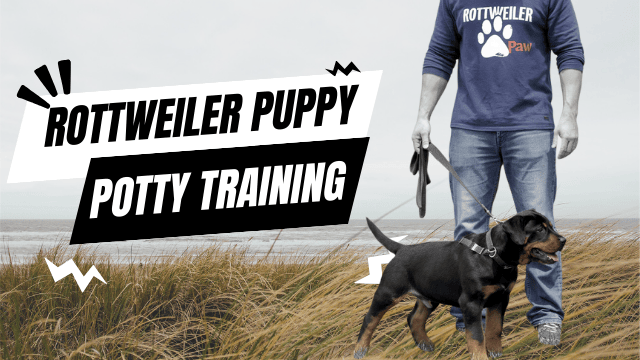


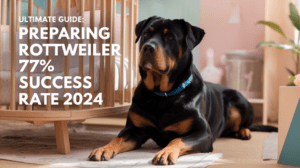
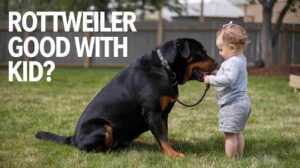
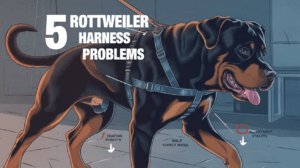
Pingback: Rottweiler Training: The Complete Guide [Expert Tips & Techniques]
Pingback: Rottweiler Puppy Training: Your First 6 Months (A Complete Guide)